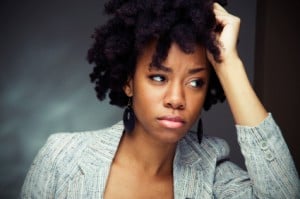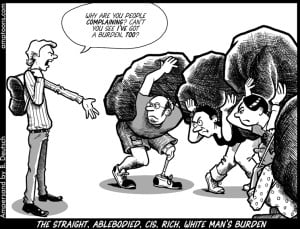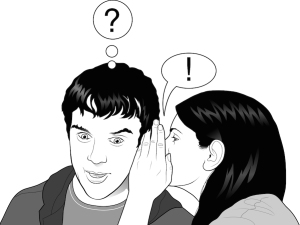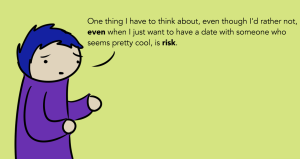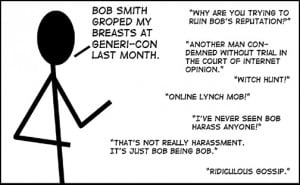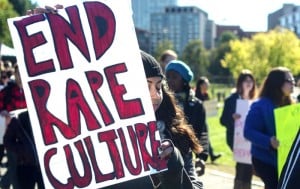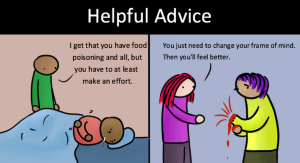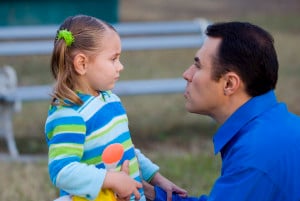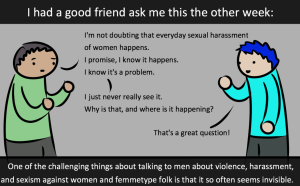
A person rubbing their temples with their fingers, as if they have a headache.
How many times do we have to do this?
Here at Everyday Feminism, we’ve covered from multiple angles, in multiple ways, the horrifying connection between racism, white supremacy, and police violence. And we’re sure not the only ones speaking out.
But still, it continues. The violence, the victim-blaming, even apathy and direct opposition to the idea that these issues matter.
All people of color are suffering from and have activists speaking out against criminalization and police brutality, and the opposition to the movement to support Black lives shows what a difficult fight this is.
The latest example that people are discussing on social media is the Baton Rouge police killing of Alton Sterling, a Black man who was selling CDs before he was shot to death.
Update: And now, in the time between writing and publishing this article, Philando Castile was killed by police in Falcon Heights, Minnesota in a horrific shooting as he followed police orders and reached for his wallet.
I’m tired, y’all. I’m tired of having to explain why the humanity of Black folks matters. Why we’re in pain. Why we’re enraged.
And why you should be angry, too.
So here’s a summary that lets the facts speak for themselves – to you, or to the people you share this with who still don’t get it. To your biased family members, your apathetic friends, even the people you know who call themselves feminists or progressives, but who still wonder why we have to talk about race at all.
If you still don’t get it after reading these facts, I suggest you take the advice of actor Jesse Williams: “If you have no interest in equal rights for Black people, then do not make suggestions to those who do. Sit down.”
Because people are being killed while those of us who know these facts wait for you to catch up to reality.
It’s time to get with the picture and take action to declare that Black Lives Matter. These facts, and the articles they’re pulled from, will show you exactly why.
Fact #1: Black Folks Don’t Have to Be Doing Anything Wrong to Get Stopped, Harassed, or Attacked by Police
You know those spam bots you can send after people who harass you online?
I wish someone would make one for this fact – so that I can spam the next person who says people should just “follow the law” to avoid police violence with every incident of a person of color being stopped by police, harassed by police, assaulted by police, and killed by police when they haven’t broken any laws.
You can find plenty of proof of this in 20 Examples That Prove White Privilege Protects White People From the Police.
So at this point, if you really still believe that every person of color targeted by police just “had it coming,” you are deliberately ignoring the truth – and it’s time to admit to your own bias.
Read More:
“Breaking down the numbers for New York City’s Stop-and-Frisk policy, it’s clear how often race determines who gets stopped. In 2013, nearly nine out of ten of those stopped under the policy were Black or Latinx – and about 90% were innocent.
Innocence makes no difference in these tactics of policing, as Miami resident Earl Sampson can confirm. Sampson was stopped by police a whopping 258 times over the course of four years, most frequently being accused of or arrested for trespassing at the store where he works.
The idea behind such policing is that it’ll get criminals off the streets.
The reality is that it’s legal racial profiling, harassment of innocent people of color, and just one more factor that leads people of color to feel unsafe around police.”
Fact #2: Black Folks Routinely Get Harsher ‘Punishments’ Than White Folks Acting on the Same Behavior
Even if you believe Black victims of police violence deserve to be “punished” for what they’ve done, you can’t support us being punished more harshly than white folks who are doing the same thing, can you?
I’m putting these so-called “punishments” in quotes, because it’s clear that the response to our behavior doesn’t fit the “crime.”
Sometimes, what leads to police violence isn’t a crime at all – we’re profiled as criminals just for living our everyday lives. Even when we are breaking the law, we’re arrested at higher rates and given harsher sentences.
There’s also the fact that we’re supposed to have a legal system that respects our rights – even breaking the law should not be “punished” by on-the-spot execution.
But read Jezebel Delilah X’s 4 Reasons Why the US Police Force Is an Extension of Slavery and White Supremacy (That You Were Probably Never Taught), and you’ll see that these unjust reactions to Black folks’ existence are the norm – they’re built into the system.
Read More:
“While the quota system is supposedly illegal, it’s common knowledge that officers are encouraged (as in threatened) to make a minimum number of arrests – each day.
Because predominately Black, urban communities have more poverty – which often results in more instances of survival crime, like drug selling and purchasing, sex work and trafficking, and thievery – a higher presence of police officers are dispensed into those communities with the specific intention of targeting and arresting Black people.
These officers are rarely from the communities they patrol, and they’re more likely to utilize stereotyping and racial profiling to identify potential criminals. This means that all of us are potential criminals.”
Fact #3: Even Black Children Are Held to Impossible Standards to Avoid Police Violence
So you think adults of color should “know better” than to end up as victims of police violence (even though sometimes all they’ve done is exist as a person of color).
But are you really going to apply the same standards to children?
We excuse kids for “misbehavior” all the time, understanding that they’re still growing, learning, and needing support as they grow accustomed to the ways of the world.
It’s simply cruel to try to control a child with violence – and we all seem to agree on that until it comes to police violence against children of color, as the disturbing examples show in 5 Ways People Excuse Police Violence Against Black Youth – And What They’re Missing.
Read More:
“People find many reasons to say that a police officer “had” to use violence against Black children. They say the young person must have been so out of control, so threatening, that only violence could subdue them.
The big threat here is the fact that so many people see Black children as older and more guilty than their white peers – this bias is endangering Black children’s lives, as law enforcement officers use more force against them, and are likely to have that force deemed justified.
Tamir Rice was twelve years old when he was gunned down by a police officer, who later said he thought Tamir was “about twenty.” The officer arrived at the playground where Tamir was walking with a toy gun, and took less than two seconds to shoot him dead.”
Fact #4: Black Folks Face More Scrutiny for Our Protests
To tell you the truth, I can’t believe I even have to write this article. Why the hell should I have to convince anybody that anger about targeted police violence is justified?
Why in the world is saying something as simple as “Black Lives Matter” so controversial?
Throughout history and still today, there are countless examples of people who are being treated unfairly standing up for their rights. There are even examples of people rioting for things like sports events and pumpkin festivals.
Many people understand destructive passion for a football game. They understand why the first LGBTQ+ Pride Parade was a riot. They understand how the system can work against us and need dismantling when it comes to women’s rights, veteran’s rights, animal rights, and more.
But many of these same people demonize Black activists for taking action against police violence.
Check out how Sincere Kirabo broke it down in Why White America Demonizes the #BlackLivesMatter Movement — And Why That Must Change.
Read More:
“White fragility prompts the superficial “but all lives matter!” crusade.
White fragility purposely sabotages earnest racial discourse. Further, it cleverly attempts to place undue emotional labor on Blacks, which is why it’s also be considered a form of violence. From the vantage point of the privileged identity, it’s incredibly difficult to see why change is necessary.
BLM rightly highlights social imbalances.”
Fact #5: The System’s Not Broken – It’s Operating Exactly As Designed
Maybe you’re starting to get why I’m so angry about racist police violence – and the victim-blaming and silencing that follows. Maybe you’re starting to get angry, too.
But maybe you’re still targeting your anger at the “few bad apples” in our criminal justice system who have acted on their own personal bias to arrest, incarcerate, assault, and kill people of color.
It’s way past time to start thinking about the bigger picture.
This isn’t just about a few racists slipping into police departments and court rooms. It’s about the fact that this whole system that we’re taught to rely on to keep us safe was created to target and disadvantage people of color, and it still operates that way today.
Don’t believe me? Diving into the articles I’ve shared so far will tell you everything you need to know, but if you still need more convincing, check out this Equal Justice Initiative video on how US slavery turned into mass incarceration.
Read More:
“For another 100 years black people were racially segregated, denied the right to vote, education, and basic dignity. They were humiliated, beaten, or killed for minor offenses, or for protesting. The Civil Rights Movement of the 1950s and ’60s helped to end legally authorized racial segregation, but racial bias still persists.
Today a presumption of guilt is a sign to many people of color who are disproportionately arrested, convicted of crimes, and sent to prison. African Americans are six times more likely to be sentenced to prison for the same crime as a white person.
One in three black males born today can expect to spend time in prison during his lifetime. Police violence against black people is so epidemic that civil rights demonstrations have shut down cities across the U.S., as thousands of people march to protest police brutality.”
***
Even though the issue of police violence is about some complex issues, like white supremacy, and big institutions, like the criminal justice system, we can’t forget that it’s also about human beings.
Alton Sterling’s family, friends, and community lost a beloved one of their own. In one video, his 15-year-old son loses control of his emotions, weeping and collapsing into the arms of a grief-stricken man behind him.
We must let go of the remaining biases, the lack of information, and the apathy that makes so many families go through such horrific pain.
These are the facts, and there’s no denying them. All that’s left is to take radical action to change them.
[do_widget id=’text-101′]
Maisha Z. Johnson is the Digital Content Associate and Staff Writer of Everyday Feminism. You can find her writing at the intersections and shamelessly indulging in her obsession with pop culture around the web. Maisha’s past work includes Community United Against Violence (CUAV), the nation’s oldest LGBTQ anti-violence organization, and Fired Up!, a program of California Coalition for Women Prisoners. Through her own project, Inkblot Arts, Maisha taps into the creative arts and digital media to amplify the voices of those often silenced. Like her on Facebook or follow her on Twitter @mzjwords.
Search our 3000+ articles!
Read our articles about:
Our online racial justice training
Used by hundreds of universities, non-profits, and businesses.
Click to learn more







